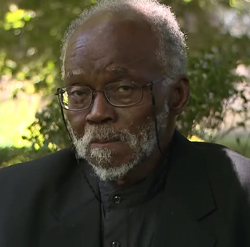
Your complimentary articles
You’ve read one of your four complimentary articles for this month.
You can read four articles free per month. To have complete access to the thousands of philosophy articles on this site, please
News
News: June/July 2025
Renowned Ethicist Alasdair MacIntyre Dies • Thoughts About Happiness • Sex versus Gender in the Courts — News reports by Anja Steinbauer
Valentin-Yves Mudimbe has died

Valentin-Yves Mudimbe 2013. Screenshot from video conversation with Boaventura de Sousa Santos at http://tiny.cc/Mudimbe
Photo © Alice Ces Creative Commons 2.0
The Congolese philosopher and professor of literary studies Valentin-Yves Mudimbe has died. Having emigrated to the United States for political reasons in 1979, Mudimbe lectured at Haverford College as well as Stanford and Duke Universities. Known mainly for his influential 1988 book The Invention of Africa, Mudimbe challenged the assumptions and the epistemological basis of historical accounts of Africa. Mudimbe died on 22 April 2025 at the age of 83.
Spain Honours Byung-Chul Han
The Korean-German philosopher Byung-Chul Han has been awarded the Princess of Asturias Award for Communication and Humanities 2025. The award is to honour “the work of fostering and advancing the sciences and disciplines considered humanistic activities or any activity related to social communication in any of its forms” and is very prestigious; in Spain it is comparable in importance to the Nobel Prize. The award committee says in a press release: “Considered one of the most prominent contemporary philosophers, Byung-Chul Han has above all dedicated his thinking to what he calls the ‘burnout society’ and the ‘transparency society’… Highly critical of neoliberalism, Han believes we live in an age of neuronal disorders (depression, chronic fatigue syndrome, attention deficit hyperactivity disorder, etc.) caused by an excess of positivity in a society that has abandoned reflection, retreat and meditation, and therefore does not value individuality. He argues that this is a society increasingly dominated by narcissism … in which we become progressively incapable of relating to others.”
World Happiness Report
Did you know that there is a UN International Day of Happiness? In time for its celebration on 25 May, Oxford University published its World Happiness Report 2025, which finds that people are kinder than we think – which certainly is news conducive to happiness. It also ranks the world’s happiest countries based on a wide range of criteria. Spoiler alert: Finland comes out top for the eighth year running. The United States, plummets to its lowest-ever position at rank 24, and the UK, coming in at 23, has its lowest evaluation since the 2017 report. Choosing interdisciplinary approaches, the report examines the meaning and reality of wellbeing of people around the globe. For example, “sharing meals with others is strongly linked with wellbeing across all global regions” and household size matters: “four to five people living together enjoy the highest levels of happiness in Mexico and Europe.”
Variations in Happiness
The above World happiness report links well-being to GDP, life expectancy, and access to healthcare, falling in line with one of the established theories of happiness, called ‘bottom-up’. The other main theory (top-down) suggests that if you’re a happy person, you will probably feel good about your job, relationships and health, no matter what they’re like. Now new research suggests an alternative approach, finding that happiness and what causes it differs for different people. Latest research by Emorie Beck (UC Davis), Joshua Jackson (Washington University in St Louis), Felix Cheung (University of Toronto), and Stuti Thapa (University of Tulsa) published in the journal Nature Human Behaviour calls for a personalised happiness model. This massive study, involving 40,000 people across Germany, Britain, Switzerland, the Netherlands, and Australia over 33 years, collected each person’s overall life satisfaction levels and how they felt about five key areas: work, income, housing, health, and relationships. They identified no less than four happiness models, including the aforementioned top-down and bottom-up, but also bidirectional and non-directional, of which people can have unique combinations.
UK Supreme Court Ruling
In a landmark ruling on 16th April 2025, the UK Supreme Court handed down its judgment in the case of For Women Scotland Ltd v The Scottish Ministers which determined the correct interpretation of the protected characteristic of sex in the Equality Act 2010 (EA 2010). The court ruled that “the words ‘sex’, ‘woman’ and ‘man… mean (and were always intended to mean) biological sex, biological woman and biological man.” ‘Biological sex’ was taken to mean the sex of a person at birth. Trans-identified individuals are also protected under the EA 2010, but in a separate category, as ‘gender reassignment’ is a different and separate protected characteristic from ‘sex’. (The EA 2010 prohibited acts which put individuals or groups at risk of suffering discrimination or harassment in relation to the characteristics of age, sex, race, disability, religion or belief, sexual orientation, pregnancy and maternity, gender reassignment and marriage or civil partnership.)
Australia’s Tickle vs Giggle Case
In contrast to the above, Australian judge Justice Robert Bromwich found in April that case law has consistently seen sex is “changeable and not necessarily binary”, as he found in favour of transgender woman Roxanne Tickle, who had sued the social media platform Giggle For Girls and its CEO Sall Grover, seeking damages amounting to A$200,000. Having been denied access to the app, which Grover had designed as “a safe, women-only space”, on account of being biologically male and protesting “persistent misgendering” by Grover, Tickle was ruled by the court to have been a victim of indirect discrimination.
Alasdair MacIntyre Has Died

Alasdair MacIntyre at University College Dublin, 2009
© Sean O’Connor 2009 Creative Commons
Just as we were going to press we heard the sad news of the passing of Glasgow-born moral and political philosopher Alasdair MacIntyre. His most famous book After Virtue (1981) is widely considered a classic of moral philosophy and contributed greatly to a new wave of interest in virtue ethics in the late 20th Century. A senior research fellow at the Centre for Contemporary Aristotelian Studies in Ethics and Politics at London Metropolitan University, Emeritus Professor of Philosophy at the University of Notre Dame, as well as permanent senior distinguished research fellow at the Notre Dame Center for Ethics and Culture, MacIntyre lectured at numerous universities, including Yale, Duke, Brandeis, Vanderbilt and Boston Universities. MacIntyre died on 22 May 2025 at the age of 96. A full obituary will follow in the next issue of Philosophy Now.









